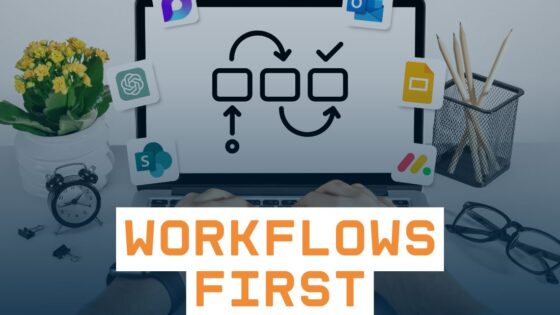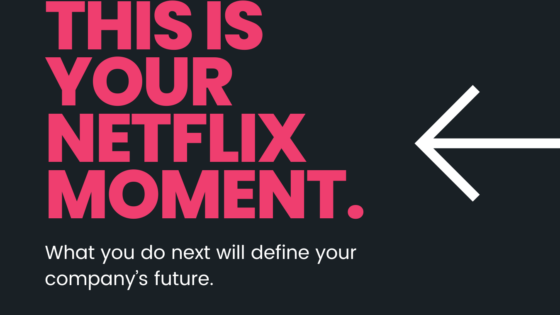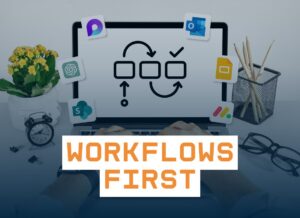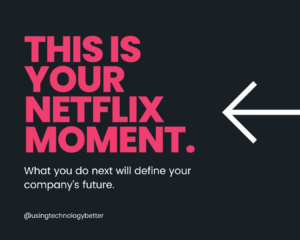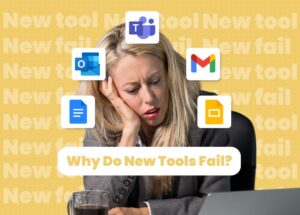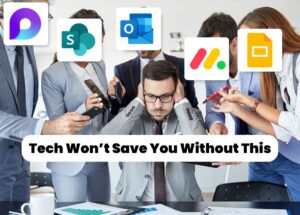Get Notified Of Future Episodes: Apple Podcasts | Spotify | Google Podcast | Stitcher | TuneIn + Alex | Podcast Addict | Podchaser | Deezer | Listen Notes
In this Episode:
In this week’s OutClassed Podcast, Mike and Blake speak with Caitlin who moved from a traditional teaching role to working in a remote learning role, eventually managing a team of remote teachers.
Caitlin has returned to the classroom this year, and shares her experience of both worlds and what we can learn regardless of whether your school continues to offer a remote learning option or comes back to a full in person teaching load.
To see all the Outclassed episodes go to utb.fyi/outclassed
[buzzsprout episode=’3628012′ player=’true’]
Podcast Episode Highlights:
1:00 Introducing Caitlin and her background in various teaching roles
3:25 Caitlin answers the most frequently asked questions re online learning best approach and tips covering best practice re pacing, how to check in on students, how to create bit sized teaching pieces
21:05 How do we handle assessment
27:55 The relevance of school, tertiary education and on the job learning with school reimagined
46:00 Wins and fails
Transcript:
Blake
It’s a pleasure to be back with you today. I’m excited to talk about, few things around again, this distance learning topping that’s been coming up a lot in the news. And obviously if schools grappling with now and where I am, schools grappling with at least a term of remote learning. And I was going to be lots to talk about today. But what are you up to, mike? You’re still still in isolation? Yep. Still in isolation. Got all New Zealand still locked down and not going anywhere. It’s actually a bit of a cold and wet day today a bit of snow on the mountains today. So it’s a good day to thee inside recording a podcast, actually, Yeah, that view of the remarkable from your house is it’s nice. Yeah. So I guess I jumped straight into our guest today. This is our first guest on the podcast. We’ve got Caitlin Halley well here. And Caitlin has been a long, long friend of mine. Friend of the show as well and she’s had a big history with working remotely and online, trying to deliver classes and teaching online. Attitude it online. For three years, he’s managed distance learning programme for the government, including a team of 60 teachers. And it worked at Swinburne University, supporting university lecturers with distance learning technologies. So having to learn a lot from her today on what we might be doing wrong when we’re pivoting our schools to this online and distance learning and Caitlin, welcome to the show. Thanks for agreeing at such short notice.
Caitlin
Thank you. That’s fine. Thanks for having me.
Blake
Do What do you want to just maybe give a quick rundown of your You know, I’ve tried to give you a little intro there about, but just sort of what you’ve been focused on in terms of the distance learning side of things.
Caitlin
Sure, I guess I’ve always had an interesting technology throughout my teaching career, So I was always looking for opportunities to develop an online curriculum, including working in a brand new school where much of the curriculum was online, and so then sort of sought out opportunities. To work more in an online space because I think it’s a really interesting dynamic. I guess when you’ve got students that you’re not physically located with. Often you get to do more one on one work, which means you really can connect with the student and see where they are, which is really important and has that benefit over classroom teaching. I think that you make those you spend more time with one of my students. So you make those connections a bit better.
Blake
Absolutely. And I think there are a lot of challenges. And I don’t know, Mike in your position. You’re getting a lot of questions, sort of common questions you’re seeing over and over again. Do you want to talk to some of those?
Mike
Yeah, I’m just really interested in the comment you made there that you get to spend more time with students, not less. What was the average class size that you’re working with?
Caitlin
It’s interesting because I think this is the first time that people are really being asked to teach primary and secondary students online. So, a lot of the work I was doing where we’re with adults, where it is a bit different, and most of it was actually 1 to 1. We did do some small group classes that were more interactive and they worked quite well, as well, particularly in the government programme I was managing because that was migrants who’d come to Australia and we’re learning English. So to have that conversation component was really interesting. But I think that it’s a different ball game now, actually trying to teach junior students, even junior secondary students in comparison to seniors. I think I’ll certainly be looking at doing things quite differently for my juniors and seniors in terms of the amount of work and how that is structured online, how much of it they’re doing in a self paced way. But one of the things I’m really going to be focusing on is checking in with each student each week one on one, because I think that’s going to be the important thing to keep those connections up, because you can’t just transfer what you’re doing. The classroom with 26 students to suddenly deliver to 26 students online in an online classroom, it’s not the same thing to not it’s not possible, especially because we’re being imagining will be turning off Web cans and controlling the audio of students so that there aren’t Connection issues. So yes, it’s going to be quite different. I’m imagining that I’m going to do a live class each week to set students up with what we’re gonna be working on each week, checking with any questions about the work that’s been set but will be largely using online collaborative tools. I think I will work for a week and then I’ll be chatting and emailing for video, calling individual students depending on the level of support and help they need.
Blake
And that’s what That’s one thing I want to pick up on. When we had this initial conversation, you’re saying it’s going to be a lot more work for you, you know? And that kind of it was interesting because what I hear a lot of schools saying is we’re just going to pick up what we had and then use it. You know, like normal, like we just say, Well, we already have these plans online, these forms online. We’ll just shoot those out of the kids and they can hand them in. What’s the difference? So i’m keen to just unpack where that work will be like, what’s going to be all this work that we have to rebuild the curriculum and we’re just checking in with kids like what that work looks like?
Caitlin
I think that online pedagogy is quite different from face to face. So we rely on being able to walk around a classroom when we’re face to face and look over students’ shoulders and see what they’re doing or notice whether they’re engaged or not. And that gives us a lot of information about how they’re coping with the work and whether their understanding, and, where able to sit down beside them and actually help them with that work to get them going will answer the questions at the point of need. So when you’re moving online, you have to find ways to replicate that interactivity that we have in the classroom. And so there are lots of different ways you could do that, but that you certainly can’t just pick up what you have done. I think we’ll be teaching the same content, but in a different way. So my plan is to create video tutorials for my senior classes for content that I would have teached face to face short snippets, breaking down particular skill sets, showing them how I would approach a task, and then we’ve already been using one one note all year. But my plan is to push out a formative feedback template for them for each week that they fill in, where they actually go through the steps to complete the task themselves. And as part of that, I’m going to have a space for them at the bottom to put their comments on what they found difficult or any questions they like, answered. And then there’s a box underneath that, so I’ll actually go into their work each week. Have a look. Give some feedback and they will be able to access that in real time as well.
Blake
Right? Just to kind of summaries that, so short video topics. So you’ll have to go to break those topics in this short little video grabs or some kind of online format informative feedback, and live in some sort of live space to collaborate with the kids right so you can see what they’re doing.
Caitlin
Yes, I’m thinking I’ll do videos of actual live intro during. We’re using Microsoft teams, so we’ll continue to use that well as a platform, so live intros to the work each week. If we want to brainstorm to share ideas, we will be able to do that in discussion. Pages as well. Trying to keep some sense of interactivity and community within the class as well. Because students I might be feeling a bit isolated.
Blake
How do you do that through video? A whole bunch of tools?
Caitlin
Yeah, I think through a whole bunch of tools. So I’d be thinking, What are the sorts of things that we would talk about in class and how coming, Maybe replicate that online, either live or in an asynchronous way, students, you have to post on a particular top discussion topic each each week or on a particular day is part of what we’re talking about. Then we share those in the next live class we’re doing. So yeah, I guess you. My approach is to think about what I would normally do in class. Think about what the purpose of that activity is, then think about the technology that’s best going to support that same purpose, and that might mean that I deliver the session in a totally different way. But you will deliver the same sort of learning outcome.
Blake
One of one of the things that’s interesting from what I’ve observed, especially with the use of tools like Google Classroom is, they often get used to blast platforms like broadcast platforms rather than collaborative platforms. Where you’ll say, OK, I’m going to tell you, Here’s the work. Here’s the resource: he’s this stuff. And then no, no one’s ever expecting To to have a discussion on those platforms. And I’m keen to hear from you. Like, what are the things that teachers need to do to kind of inspire that community approach in that discussion kind of first approach, like all these platforms, have the ability to comment, talk backwards and forwards and even do small formative assessment in polls and things like that. What should you do? It should you be saying, and how is your day, or should you keep it on topic like one of the ways you can kind of keep that community in the classroom?
Caitlin
I think I think the key is not to think it’s going to happen automatically, because I think as a teacher, you actually will have to plan for that. So, you know, I’m thinking I teach you seven history. And so one of the things we would normally do in class during our discussion time is think about it just about starting ancient Rome. We would think about all of the different topics that they might like to research for their research project on Ancient Rome. So everybody would come up with things that they know about ancient Rome and share that as a class. And we do a big brainstorm on the board. So I mean, we could either do that, you know, you know, in a live class. But I’m actually thinking of starting a discussion board and everyone jots down their ideas and then that’s sitting there so students can go back when they’re trying to choose the topic that they’re interested in can actually go back to that discussion board and have a look through and, you know, sort of save students having to take notes while you’re having that discussion as well, capturing what’s going on, what people are saying in a bit of a different format.
Mike
So when you’re talking about a discussion board just so I can visualise that you’re talking about it like a one note page here, run put their ideas into our white board inside a team’s channel or?
Caitlin
Yes, so I was thinking about just chatting in a team’s channel for that particular activity. But one of the things I do actually in the classroom with my year Elevens is we might teach your 11 English. So one of the things we’ll do is any collaborative work that you might have previously done on a poster where you’ve sat in a group and you come up with quotes on a theme and evidence regarding a particular character in a text. I’ll actually get students to do that online. Still split them into groups, but they have collaborative space in their one note and I’ll create a one note page, for each theme and then a table, and I’ll actually specify the information in there. So, you know, page number, the theme. Who says who’s saying what to who and what’s the actual quote and why is it significant? So in that way, you’re creating a bank of collaborative knowledge that the students have access to. It doesn’t involve them doing the work twice. They don’t have to do it on a poster, and then it has to be scanned or if they’re not in the classroom, they can’t see it on the wall. So it’s thinking about how to shift those collaborative activities. You were doing class already into the online space, using whatever tools are. Schools will be using a host of different tools, some thinking about what you’ve got in your fingertips and how a Marine utilises that I think.
Mike
It’s a really good example of Microsoft teams to do that. We can spin up a channel and have breakout rooms going at the same time and then collect all that data and the chat and the white boards or the one note links are in there, then back to those groups. So I think teachers are definitely starting to think about that. How do we get students collaborating? But almost publicly, in a sense, not behind the scenes where we can’t see what they’re doing? How do we track the data on that? What does that look like? Yes, it’s a really interesting way to bring all of that together.
Caitlin
Yeah, and that there really is a big question there about what you do live in a synchronous way with everybody participating at the one time and what you choose to do, you know, self paced. Here’s what you need to get through this week. Do it when you can sort of fashion. So schools and individual teachers will be having to make decisions, too, about what they think is the benefit in, hosting particular activities online live, and what would be more beneficial for students to work on in their own time? Because we know in the classroom and students are always at different points in the task. Some students work more quickly than others. And so, yeah, I think that’s going to be an interesting tension to what he actually chooses to put online. What do you choose to bring the students together to do and to what extent you facilitate them working at their own pace.
Mike
Interestingly, my kids are in an Online school And one of the things I think about like my son is a public holiday today, but he’s doing schoolwork now, and here we look at night. But then he doesn’t have to be at school tomorrow in inverted comments, So teachers who are bringing a traditional pedagogue due to online learning. Sometimes we’ll miss the opportunity to let their students spend more time less time, different time working on that. If you are requiring them to be online at 9 a.m. In the morning, every day for a check in. Maybe that’s not the best way to go about this.
Blake
It’s interesting. It’s sort of like remote work in that sense, where a lot of remote work they’re saying, I want you to check in every day and you know, we’ve gotta be on deck at a certain time versus the outcome, rather than that sort of bum on a seat. 9 to 5, you are at your desk. Now it’s more about are you actually getting the outcome done? So that’s a bit of a mind shift, but I just want to revisit a little bit about pacing. There you were talking about one of the things that we’re seeing is that teachers want to know how far in advance they should push things, because now obviously, you could just share the entire curriculum with the kids, and they are a good luck for my job. See ya later. Obviously, that’s probably the best approach But what do you think about pacing? It shouldn’t just be similar to what you would do when you’re teaching your class? Or do you want to sort of make sure that there is somewhere for the kids who are, you know, at the top of your class to extend into? There’s also some slack in the system for students who are struggling that needs more support in more time.
Mike
Yeah, I think there’s a few things to think about there, so all the aiming to keep my students together on a week by week basis. I think if you drop the whole term’s worth of work on students, then you don’t have any ability. Kids might go through in a week and duel the work and say, I’m done and you’ve got no opportunity to scaffold how they approach that task into a level of detail. They approached the task, and it’s very difficult when a kid thinks they are done to get him to go back in and add more detailed information with something. I think there’s also I think you also need to think about how you’re going to check in with students and make sure that they’re doing something, that they understand the task and that they’re working. So you’ve always got those kids in class there, speed ahead and get everything done really quickly. And so those kids, that will be great. There might be an opportunity to put some extra do this if you feel like it’s sort of an enrichment style task. But I think that it’s an opportunity for the kids that work more quickly to have more time to themselves. And that’s a benefit. I don’t know if all parents entirely agree with that.
Blake
well, let’s find out. Actually, Mike, your kids are home school, though not home school, but online school. What? What do you think about them having more free time, like if they’re disposing around all day with nothing to do? Is that a good positive thing or or is it a problem for you?
Mike
I don’t have a problem with so long as the underlying mentality in it is That done doesn’t mean learnt. So if you’ve got these kids who are racing through their task because I want to just play Xbox for the rest of the day, and if they can show Mum and Dad, I’ve done all my work, you know, like we have some Xbox time then, you know, so long as they’re not just racing through so they can take a box. And it’s the equivalent of back in the day when you used to smash through a math assignment or something. So you go out to lunch early, or it doesn’t mean that you’re actually learnt the task, so I think there’s a bit of a balance in that. But I mean, at the end of the day, I don’t have a problem with them. If they’ve got through their work in an hour a day, then you know, what else could they be doing with that time? I’d be trying to point them towards a little bit of entrepreneurship.
Caitlin
Yeah, something that they’re really interested in pursuing in their own right? I think so. I think what’s going to be important, and particularly with the weaker students, is formative feedback. So my plan is that pretty much for every task I set, I’m going to want to see that in some way or look at the learning and it might not be something that I don’t have to provide feedback on because I think that would be very onerous. But the equivalent of sort of walking around your classroom and checking in on your students might be To to use Microsoft forms to do. It’s a two or three question survey that’s just assessing actual knowledge or the ability to answer a particular set of questions. You might get them to write a little sample introduction or a sample body paragraph and have a look at that, and you might not provide detailed feedback. But it’s a way of just making sure that students are on track because I think that’s going to be one of the challenges of making sure that you could have students that actually don’t move on at all in a week. And if you don’t catch that until week three and then there’s three weeks of work that they need to catch up on, that’s going to be an issue. So you have to have those systems in place, I think, to catch the kids that are struggling and then communicate home. Or and they might be the ones that you target for 1 to 1 online so you can actually talk to them through the activities as well.
Mike
Yeah, definitely teams and Google docs. Both have activity trackers in them. So in a Google doc, you can click the little activity bar and it tells you what’s been happening in that dock on and in teams, if you click on a chat, with a student telling you the activity right up the top, What have they been doing? When were they last logged in? So you can get a bit of ascension. Take a bit of a temperature check of where things are at But Hole assessment thing has Bean like, so asked so many times we just did a big training for South Australian independent schools. He was a number one question. I think teachers have kind of got their head around formative assessment a little bit and getting some ideas of how that happens. But there’s a whole lot of questions around somebody of assessment right now. What does that look like? And how do you stop cheating? And none of you had any experience with that. I have any thoughts that go down that path?
Mike
Yeah, Look, that’s I think that’s one of the most challenging questions. Certainly, formative affairs, formally of assessment, are quite easy. Online In my opinion, some of the assessment is a bit more difficult, particularly with senior students, when you want to be able to verify their work. And I think that that’s where that’s where I would be looking at a lot of smaller tasks done over the course off the whole topic, rather than maybe just one task at the end. Because unless you’ve actually got some online invigilation software, which does exist but is probably not really practical for this circumstance, it would be very difficult to ensure that students are not using other people’s information or notes or brothers and sisters work. You know, look, I mean, getting to parents on board might help with that as well. Getting them to sort of invigilate a task, but that might not be practical without so I think there still is a question they’re around that. You know, the types of things that you would actually have as a timed task, kind under strict supervision there very still, a bit of a challenge there I think.
Blake
Only the kids will think good kids are probably the right thing and give the kids whose parents are disengaged in their schooling That won’t be around to help them. That’s kind of a challenge. But I wonder with what you’re saying: setting smaller tasks I think That’s a great idea, just breaking it down. So it’s hard of them to kind of just say All right, I just gotta get my cheating in order for this 1 session. This way, I can just get rapped with smaller amounts all through the year and getting a better picture.
Caitlin
Because then if they do cheat in a big assessment, you’ve probably got more of an idea because you’ve seen their work the whole way through too.
Blake
Yeah, And I, I’m also thinking about sacks and this kind of stuff and how we stop cheating like one of the things we’re using because we’re a Chromebook school. We’ve got Google locked forms and of course, okay, that locks your Chromebook out, but you can pick your mobile phone up on and, sit around and google it all on answer all the questions, but But I just wonder if setting a locked form in itself is enough of an expectation was at least going to send the message that Hey, this is a lock thing. If you’re going to cheat, you’re going to cheat, we’ve had cheating in tests since they were invented. But I wonder if that’s enough to kind of set the expectation that this is a, you know, a formal summit of assessment rather than a casual little formative feedback session, so I wouldn’t have any thoughts on that.
Caitlin
I guess anything you do to reinforce the expectations is helpful. I mean, I wonder whether we think about this term by a large margin, even something that really would normally have been done under exam conditions, whether or not we’re just looking at essays and not actually grades, obviously that doesn’t work for year 12 but it works. But other year levels I think this is an exceptional circumstance. And if we were To, move secondary schooling, primary schooling online in any sort of long term way, you would come up with ways of doing that, and that might actually even be to get students to come in or in particular days or send, you know, have a little assessment centres around the place if if that was really important. But I think people need to remember at the moment or living in my opinion, really, This Is an exceptional circumstance. Got parents who try to work from home and help their kids study from home. You’ve got kids whose whole lives have been turned upside down as well. They are suddenly isolated and can’t do any of the things I would normally do. So I’m erring on the side of Make it a bit easier for everyone and, you know, make some exceptions in these exceptional circumstances, I think we’re trying to do a lot and everybody’s already dealing with a lot. So now would not be the time to make things more difficult for your stuff will be mine.
Mike
Then you’ve also got universities who are looking at entrance and you can’t say to a university. Well, there’s going to be no one entrance next year because we don’t know how To sought out a requirement to get into uni because that means that’s billions of dollars to a university that has pushed back a year. So you know people already looking at it. We’re even joking. You have a day like even if you had a proctor exam. If it’s a high stakes exam. like it’s not just those who were disengaged parents. Students were parents who are like their kids. Because you could take a prompt examination. You have to show your room and under the table and make sure there’s no devices. But I can see a parent just sliding an iPad under the door sort of thing, you know? So I think they’re about that whole flow under the university and TAFE sector. And how do you compete for university entrance when there is no Somebody was, well, hard. Some of the assessments, that’s a whole other headache. I would hate to be making some decisions on that sort of thing.
Caitlin
I know it is. It is tricky. And I think what came to my understanding when you were talking for me as well is that we’re also talking about inequality in student access to technology as well in the circumstances. I know, you know, schools are making a detailed list of students that don’t have access to technology and trying to make sure that they do have the access that they need to be successful this term, but assessment again is a whole other ball game. And It’s interesting because I’ve often thought about how the university system, I guess, works out their own means or ways of ranking students or assessing their suitability for university. Because at the moment, the restrictive nature of year 11 and year 12 that really narrow curriculum focus is solely to produce this enter or this university entrance ranking at the end of your 12 that a lot of students don’t even need or want because they’re intending to go to university. I just think, if suddenly I mean, this is: This has been a very disruptive crisis, I guess. But with disruption comes opportunity, I think. And so maybe this is the time to think about how that could be done differently, because most teachers, when you talk to them, love the fact that in junior years you’ve got more freedom to teach students views and values and how to think and how to be entrepreneurial and how to make their way out in the world in a world that’s ever changing. And then, you know, by the time we get to year 11 and year 12 we’ve got such a narrow focus on this predefined skill set to get this external ranking you know, imagine what we could be doing if we didn’t have those restrictions in the type of curriculum that were mandated to teach.
Blake
There are two remedies to that that we already have, like two instruments. We already have one of those folios. So for art degrees and things like that where we’re providing folio work any anything Finally, that is again that that’s of inequality issue as well. Because a lot of people I know who do tutoring and things like that often end up doing some of, if not all, of the folios. You know we’ll have retired art professors and artists who are helping students at year 12 do folio work, that’s like 10 years ahead of where they’re at so we have this sort of false economy of folios if you like, and everyone’s forced down the road of getting someone to help them do it because you can’t compete otherwise. But there’s the folio entrance, which is one way which has its flaws and then there’s IB like I’ve never worked in an IB school. So I’m interested to hear from Mike. Maybe, how does that stack up like, Is that Is that a good alternative? Like, how would that work with university? You know, people stepping up in the university and those kinds of things.
Mike
Yeah, potentially like, I wonder if this is not an opportunity for education to just get over the whole idea of equality and inequality anyway, like it’s the reality of life. If education has been designed as a conveyor belt, where we’re meant to turn out, students are all the same and equal on. We realise this is not really serving us as a community, and as a society we may be. We just need to let the cards fall where they may a little bit and see if we can’t come up on another system like that. I talk to some university lecturers and try to pick fights with them on Twitter every now and then because they’ll talk about their wonderful university of programmes that once you’re in year two or year three, there’s no exams. It’s all on the job training and you get reports back from your workplace. But I’m like, but still get into university. I’ve still got to get a certain grade to get in before I could be like that. So you know, And then once you’re on the job, there’s no two jobs or equal. So how do you know you might have one boss is a real bugger, and you’ve got another guy who’s super soft and so you know, and they’re both providing feedback and marks to the university is how well you’re going as a student. So I don’t know. I just think maybe we need to look even a bit beyond something like an I B framework, which is a little bit looser in terms of how students get there. But in some cases, the outcomes were kind of saying, I don’t know if that’s a little bit controversial how teachers would react to that. But, you know, there’s a lot, a lot to be said. We’ve students who can bypass the whole university system and go and just cut that whole process out, go straight to a job and start earning good money and build a career based on their portfolio of work, not from a piece of paper which no one ever looks at again.
Blake
they are 4-10 years ahead. I think there are caveats to that. Like you want to be a doctor, for instance, there’s significance. I don’t think you can sort of entrepreneur your way into a surgeon’s position, but on and for good reason.
Mike
Maybe you should be able to.
Blake
Okay, I’ll tell you that up to your next surgery, mike Well, maybe you should be able to. That’s an interesting idea, but I do think there is a purpose when it’s a process driven industry, something like surgery, for instance. There’s limited creativity in that In those endeavours, it’s about doing what’s best practice and what has the best odds of survival. So they’re quite procedural. It’s sort of like being an aircraft pilot. You go through a very procedural process. And you know, this Mike used to fly light aircraft wasn’t out of Nowra, and it’s all books, isn’t it? So if this then that I need to remember that’s a familiar thing that schools have been doing for a long time. But it does. It does become a problem when you’re talking about 21st century learning and moving into a knowledge based work where it’s going to be how do we compete? How do we do things better? How do we can’t with new ideas? How do we take existing models and transform them? That kind of thinking, I’m not so sure this has always been My view is that schools aren’t really creating great opportunities for students to embrace that, especially at the high end of senior school, which is the time they need to embrace that because that’s the time they’re closest to actually doing the work. So, yeah, I mean, it’s interesting, but like, what does that look like Mike is saying? Is that more of a folio approach or you staying closer to I.B I’d like, What are those ideas kind of look like?
Mike
You know I think it is. I think it’s folio. I think it’s work experience. I think it’s demonstrated capabilities like My biggest thing is just say you’ve got this student who’s an amazing engineer, can build great things in the backyard and has a real mind for building systems processes. It’s got a d d. Can’t sit still in school for love or money can’t do well on a test because they get into a test and they freeze and So they’re locked out of an engineering degree because they didn’t get the end of school mark that they need for that particular course but would be an amazing engineer. So I think there needs to be something that show’s competence on the job or confidence to learn quickly around that. I mean, I used to work in pathology, not used to work in a hospital. And so I know the hospital system really well, and I got 100% in my blood banking exam, so cross matching blood and giving blood transfusions. I haven’t worked in pathology for 20 years. If you ask me to do that right now, kill someone. So there’s a hole like this is where our wrestling, even with my own, kids like learned doesn’t mean ability to be able to do things, And it certainly doesn’t mean retention down the track. You know, when you’re working in a hospital situation, you learn more from being next to a doctor in a situation than you ever would from a textbook which, by the way, are allowed to date by the time you get to actually practice it. I remember sitting in a University lecture on neurophysiology and all about the brain and what you couldn’t couldn’t couldn’t couldn’t do in the brain. And then you get into the hospital, and now that’s not right. We’ve learned since then that everything you just learn at university is completely outdated and not just outdated but actually wrong. So I think when you step back and you have a look at this, somehow there needs to be something like an aptitude test. Or, you know, some way that you can’t just be a one size fits all approach. There needs to be some flexibility to be on a look at Students based on merit So ever that’s an interview, that’s right, an application whether that’s demonstrated via some form of media like a portfolio. I don’t have the answers to it, But you know, like right now wrestling with because I’ve got a daughter is 1-2 years away from uni. I’m like, I don’t even know that I want her to go, to be honest, because I think she could just cut the whole process and way ahead of the same time. The traditionalist teacher in me says this is the pathway that you’ve gotta walk. So I don’t know.
Blake
There is a great visual of a page of the holiday dots on it, and all those dots represent knowledge. There’s a pager. All the dots are connected to that represents experience. So you know you’re going to learn as you get experience. But it’s about not just knowing that, you know, like you said is learning the information. Can I multiply? Yes, but I have some experience in the industry where I need to multiply suddenly that multiplication skill becomes super important. I need to use it a lot. And therefore I can connect those things together and understand why I need them. I’m a big proponent of that. And like I think that school does fail a lot of people, particularly in the ways you’re talking about, particularly as well around just the region. Regional demographics about you’re the top of your class in a bad school. And then you go, you think of, you know, great job here. Then you don’t really compete up the road where you’ve got, you know, really highly academic kids. How you kind of bring those worlds together, and I think we have this opportunity now with online learning that we can bring those things together and bring everyone up if you like, bring the whole the whole lot up. And it’s not just about traditional academia. Like I had this hare brained idea for, like, a school that kind of has a microcosm of capitalism sitting inside of it wherever it has to do work. So you’ve gotta, like, work at the canteen. You’ve gotta work with the grounds crew. You’ve gotta work with the pedagogy teaching people sections and the teachers behaviours like the government so they don’t do much work. Really. They just provide policy and governance and safety and all those going things. I think that’ll be a great way for what you were saying. Mike is to kind of demonstrate that knowledge of the well, how did you perform when you’re doing food safety in the canteen? How did you perform when you’re doing construction? You had to do maths and understand those kinds of principles. And of course, it’s still a place for academic work, and for the learning process and your traditional book work. But I think that that’s probably less of a focus now than it ever has been in the past.
Mike
Yeah, I think that’s a perfect model for a school of often said, like if we were going to ever build a school would be one. Whether it’s students had to work in industry is part of the curriculum plan. So you have a place like Queenstown, an event centre, and they’re running all the events: the lighting, the staging, the ticketing, the sales. You got all your numeracy and all the illiteracy and critical thinking and feedback loops and collaboration like all of that starts getting built through those particular skills. And the school is serving the community in an authentic way. So I think, you know, there’s lots of lots of opportunities to re imagine education right now, but I think everyone just needs a moment just to get their head back above water. And you know.
Caitlin
that’s true. You probably shouldn’t try To entirely restructure the education system at the back of this term, but it’s definitely an interesting time to take a pause and think, What could we be doing better? And what opportunities does this afford us? I think.
Mike
the worst case scenario is going to go back in a term, not 10 -12 weeks, and everything is going to go back to how it was before. That would be a disaster. Teachers that have created all this online content. The last thing you want to do is then to put it in a virtual filing cabinet. Never touch it. And surely we could be doing things. We flipped classes next year and repurposed content and used it for assessment and revision later on. So hopefully teachers have taken the opportunity to think a little bit beyond the next three months. To ok If I did a task now and I did it well, what would that look like next month? Next term next year And so on.
Blake
I wonder if it is up to the teachers, though. Mike, because we can try and change the system internally and try and do things more progressively. But if the structure like that a tar is still in place, or that the school’s traditional instructional model is in place, which shows good results and is the best thing that you could do for those students to give them the best chance of getting into university, which gives them the most options in life. That’s where I think the struggle will be. I don’t think there is any doubt about this. We’re going to have much better skill sets of staff for remote learning. I think everyone is going to pick up a skill, whether it’s using Google Classroom, whether it’s doing flipped classes, classroom or using video more powerfully. You’re getting better at video, but I think it’s when we come back. Those tools are going to be in the toolbox. It’s whether the schools decide to use them. That’s where I’m not sure. I’m keen to hear what you guys think about it, whether it will happen or won’t happen or whether we’re just. It’ll be a blip on the radar in two years and we’ll think I remember that time we talked from home.
Caitlin
That’s really interesting because I think this is the first time really. Now we’ve had this massive forced upskilling in somewhat of a panicked way in a lot of circumstances, because it’s really the very last minute of an entire teacher cohort, you know. And as you said, people are learning skills that they may have thought previously were not relevant to them, and so they would never have bothered to learn a whole lot of the technology that they will be now forced to use out of necessity. So it’s interesting to think about what sort of flexibility that might give us in terms of timetabling, you know, next year and beyond. Do students have to be in class for five periods, weak face to face? Or can there be split components? And do you have particular cohorts of kids that opt to do a partly online curriculum? or a . whole Online Curriculum It’s interesting to think, because it’s opened up those opportunities and. Look, I guess part of it depends on the experience people have, too, and they’re actually doing online learning. There’ll be people to find a really uncomfortable and who really struggled with that. And you probably come out at the end of this term and think, I don’t ever want to do that again and then and that it doesn’t work. And then there’ll be others who managed to translate their classroom teaching into an amazing online curriculum and who love it and actually can see that it’s a really beneficial way to move forward. So said, Interesting.
Blake
I know we’ve got to get to wins and fail in the SEC mike, but just quickly that this is from my perspective as the IT manager looking after, you know, 200 staff, 2200 kids. What is my focus? My focus is right now on easing any friction, making sure that if kids have any problems that we solved those that the teachers aren’t running into roadblocks remotely because And to do that in a kind of exceptional way, not in a well, this is the policy, you know, you can’t have a spare device or whatever where sort of saying, Well, let’s just give everyone the best opportunity we can right now because the first impression we make now I feel is going to be the most important one for having any chance of this stuff lifting off the ground in the next few years when things do settle down.
Caitlin
Yeah, and enabling staff as well, who are creative and have ideas about how they can do things enabling them with the technology. They need to be able to do that well because they it will be those experiences that we learn a lot from as well.
Mike
we’re talking to an IT team from a fairly exclusive high school in Australia and they’re seeing the opportunity right now, so they’re a very direct, instructional kind of school. It gets the results they want, but they’re like, Right, we’ve seen the light. We can record every single one of our classrooms moving forward. We can take all of those video recordings. We can make them searchable so students could go back and find information that was shared in a lesson. All that information could be fed into a I and we can create chatbots and they’re like, they’re starting to think big. They’re going. Okay, we’ve got all this data how we’re going to improve teaching and learning on the back end of this. So they’re seeing it from an IT infrastructure point of view. What do they need to do to enable this? But then, from a teaching and learning point of view, you know, what could we do with all this data that we’re all of sudden putting all online? All of our courses are online. All the videos are online. Well, let’s not just put in there and forget about it. Where’s the second mile in that? Seeing what sort of results you can get, I think you’ll find that there will be some schools, even though they’re quite traditional in their approach. That will be out of leverage. Technology to even To. Push that even further.
Caitlin
Yeah, and hopefully this is a great pivot point for that way. Won’t ever go back to doing things exactly the same way as we did, because we see the opportunities in maybe not wholesale online learning that we’re being forced to do at the moment but picking up elements of what’s working really well and rolling there. Yeah, structured way.
Blake
Yeah, well wins and fails this week. Mike. Anything on your radar? Anything you’ve seen that’s good or bad ugly.
Mike
To be honest, this week I’ve been kind of head down bums up trying to get through a whole bunch of project work with schools. But I have noticed a couple things coming out in the media in New Zealand in particular. So unlike you guys like your premiere came out and said, we’re probably going to shut schools. To the end of the term. So when is that for you guys were talking End of May early June, Right?
Blake
Yeah, this’s week one on, don’t we It’s an 11 week term I think so.
Mike
Yeah. So into the middle of the year. But Australia is not officially locked down. New Zealand on the other hand was officially locked down. You can go anywhere, do anything except for go to the supermarket. And yet they’re saying as soon as we come out of Level four lock downs which potentially could be a week and 1/2 or so that schools may start, To start to gradually roll out again as early as the end of it in three weeks time at the end of April. So I’m also looking back and yeah, look at the back end of that. The New Zealand government has just bought or leased 70,000 devices to give the students you don’t have them across the country. So I want and I’m kind of thinking this is not going to be a short term solution. If you’re buying 70,000 devices, you want to get some use out of those but at the same time, they’re trying to give our guest some sort of level of a surety that we will come out of this.
Blake
Mike are you suggesting that one part of the government is not talking to another part of the government? Well, yeah, you would know that’s interesting. It would be hard as a teacher, like, let me ask you this. If you were, if you were still in the classroom, would you run out and plan the whole term online? Well, would you be thinking I’ll just wait and see? I’d be thinking online, but I would be thinking this time I’d be thinking long term, Yeah, but I reckon a lot of people would think Let’s just wait and see and then be kind of scrambling in three or four weeks when they run out of there. Their prep work makes it very hard. I think if you want to do it well, you’ve got to really do it up front. Definitely. I think 80% of the teaching population are just hanging on by their fingernails, waiting for this thing to be over way.
Caitlin
We’ve at least been given some certainty I guess, knowing that you will likely be the whole term and so we were actually planning Once we got this the topic with our seniors were in the middle of the topic on such topics. Ended will be planning in year level groups so that consistency around the content we’re creating and sharing and our approach, so that’s sharing the load. You’re not expected to do all of that on your own, which is really good. But if you didn’t know how long you might be teaching our mind for, that would be a bit more difficult.
Blake
A couple of wins and fails, and the 1st one is I realised I had someone email me over Easter weekend. You got locked out of their account. One of my staff and I’ve realised how detrimental. That’s going to be especially in schools that are, you know, haven’t moved that much online. That air suddenly forced into it. We don’t have that structure that the kind of supports in place to manage it, because if you get locked out over a long weekend over four days and you’re planning on doing some work, you literally can’t do anything. It’s not the old days, you probably had some forms that you’ve got the kids to fill out with paper that was sitting around, whereas now there’s just nothing to do at all, so that that’s a bit of, Ah, fail there of like, you know, making sure we’ve got those supports in place. In terms of a win is This is a bit of a side topic that I’ve been tracking. It’s a win and a fail, I guess, but depending on how you look at it, I notice in the news. Google and Apple are now working together on a covid app that will use Bluetooth to track where you’ve been all day for 40 up to 40 days. Then it will do it anonymously, supposedly, and data will be deleted after 40 days supposedly and that if you travel near someone and then you activate it and say, I’ve got now got covert and I think I don’t have health care, do this. You do this a bit unclear, but it attracts everyone you’ve been in contact with, and they will get notified and they have to isolate us well. And of course, there’s heaps of little issues around whether that works, you know, the person who’s on the other side of the wall also gets notified there. They never saw you and I don’t have any risk factors. But I thought that was really good in one sentence that it lets the economy start back up in a way that kind of can help stem the infection rates. If it does kind of break out again, you can say, Well, we know who came in contact with. But it really does seem, Oh, alien in the sense that we now have companies and governments kind of controlling a lot of information. A lot of where we do a lot of what we do and these two big companies, Apple and Google, working together, I thought was interesting as well. You don’t often see that all for the greater good. But I’m always reminded that if let’s say the KGB, the NSA and CIA all got together and tried to invent the best possible way to track people around the globe, they couldn’t even their wildest dreams have imagined something like Facebook. And I just wonder whether this is an extension of that and it raises a lot of questions around privacy and the efficacy of it. And how much do we trust these companies to not mess it up and not allow bad actors into the system to cause mayhem?
Mike
It’s a bit scary, isn’t it almost black mirror-ish. It’s got a good intent. That else they could be skewered one way I know Last week Google released all the data to the New Zealand government on people’s movements, and it was like, Oh, yeah, that’s right. They do track me kind of moment where they’re saying, You know, we’ve seen across the country that trips to the supermarket of increased X amount of percent, but trips to your work of decreased so many they are monitoring everything they know down to the metre, where you are, how long you’ve stayed there and for the fact that they would say I will delete it after 40 days. That 40 days worth of data is like a gold mine of information, Right? How long did you stay in a certain area? Who did you meet with? Like all of that social mapping? That’s crazy. And there’s no such thing. It’s hard to leave either. You can say I deleted things But we all know you can always pull things back later if you need To. Yeah, I think if people find out about this sort of thing, they would. Yeah, I think they have to have some civil liberties questions that have to be raised in that.
Blake
That’s why I think that’s a win and a fail. It is interesting that the tech companies are pitching in and trying to do something. But you do worry about the long term impacts of this kind of stuff and where it leads To, the loss of our liberty and how that impacts everything and also alone on effects, into schools, into education, Everything. So yeah, scary. But it was interesting to see that.
Mike
Yeah. it’s been an interesting conversation. Caitlin, I appreciate you taking time out of your day and you’re planning to come and share a bit of your wisdom with us. That’s good to hear for someone who’s been in that traditional space and then left it to go online and then come back to our more traditional workflow and where your brain is. Is that where you’re thinking?
Caitlin
Then it’s kind of exciting. I didn’t think that I came back to teaching that I was going to get an opportunity to use my other skill set. So, you know, an interesting term. Thanks very much.
Blake
Thanks again, guys. And look forward to seeing on the next one Mike
Mike
Thanks for listening for more episodes and show notes, visit utb.fyi/outclessed









